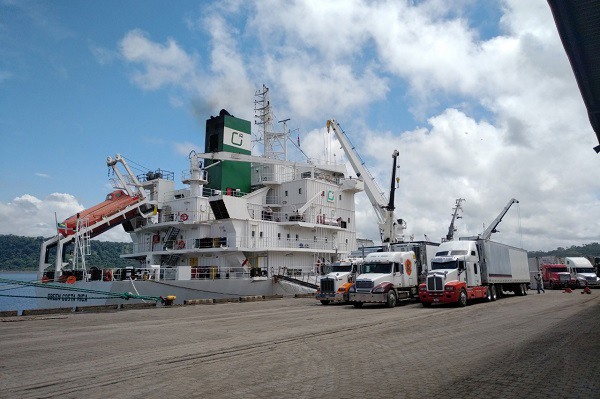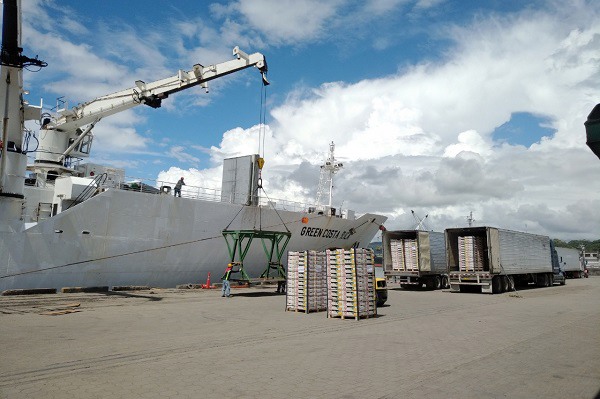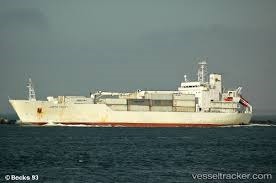A direct shipping link from Mexico to Rotterdam would be more than welcome. After almost three years of research, preparation, planning, test sailing, and waiting - a lot of waiting - it seems this fixed liner service will start from this summer. "A direct sea route will boost Mexican exports," says Lia Bijnsdorp , United Producers of Mexico's (UPM) Managing Director.

UPM was founded in 2016 to improve and increase Mexican agri-exports to the European market. "In the beginning, the focus was mainly on strengthening Mexican grower organizations' position in that market. The knowledge gained forms our current business model's foundation, with 'improve' as the keyword. You can only strengthen Mexican producers' position internationally if various aspects in the export process are improved."
Lia says Mexican exporters and, especially growers, want to export but are not always prepared for that. "Mexico's image has been mixed on the European market for a long time. But, opportunities abound. Mexico is, for example, the world's largest avocado producer, with about 30% of the global total. And that sector's still growing. Most Mexican avocados go to the United States, and there's strong domestic consumption too. Still, there's so much production that this product is expanding in the European market."
Yet, as soon as avocados are shipped until they reach consumers, many, unfortunately, are still lost. UPM is committed to greatly minimizing that loss. Remarkably, in Mexico, there's little to no loss; avocadoes' leaves, skin, and even the pits are used. The fruit for guacamole, the pits for oil, and the peels for organic compost. "Everything is used. In Mexico, food banks even give away avocados that can't be sold."
Connecting Mexican production to Europe's market
How does UPM connect Mexican exports and the European market? “We organize things like trade missions to introduce Mexican exports to the European market. Often this is coupled with company visits and participation in an international trade fair. The next trade mission is planned for April, which will be combined with Fruit Logistica. We also arrange matchmaking sessions where exporters meet up with potential new customers," Lia explains.
"There are business forums that give exporters information and guidance on developments and trends in areas such as market conditions, logistics, research, and certifications. And we partner with quality improvement solutions providers. These are preferably companies and organizations from the Netherlands and Mexico like Holland House Mexico and the embassies."
Shortened sailing times
Lia divides her time between Mexico and the Netherlands. When we spoke to her, she was in Mexico, in the avocado orchards, close to the growers. In recent years, one of the quality improvement activities Lia has been involved in is establishing a direct shipping connection between Mexico and Europe. "The long transit time from Mexico to Europe is a recurring topic. People always ask why shipping takes so long."

"Ships from Peru, for example, take a week shorter than from Mexico, while Peruvian ports are further from Rotterdam. And, for fresh fruit, a week makes a big difference. It takes longer to ship Mexican products because the ships dock in the U.S. or Central America along the way, slowing them down enormously. Enough reason to make a strong case for shortening the shipping time, which also reduces quality and product loss."
Maiden voyage done
UPM approached the major shipping companies for the first time about this in 2019. "For them, it's mainly a matter of large volumes. Mexico doesn't have enough to fill a direct line through them. However, Europe is indeed an interesting market for direct shipping," Bijnsdorp adds.
"That became apparent when we reached out to smaller specialized shipping companies like Seatrade. These companies transport only fresh and frozen products. Their ships have large cold rooms in their hulls and room on top for refrigerated containers. That makes shipping extra challenging, but it's currently the only way we can set up a direct sea route."
In 2020, planning for the first test voyage with an avocado/lime load from Veracruz to Rotterdam began. In September, it was time. "The ship took 14 days, a big difference from the usual 24. After that, we did everything we could to set up a fixed program, but the pandemic threw a spanner in the works. The hospitality industry closed, so the demand for particularly limes dropped sharply. There was insufficient trade to sail every fortnight," Lia continues.
Gathering enough volume
Consequently, with the help of financial partners, UPM set up partnerships to gather sufficient product volume. "In 2021, demand for Mexican products rose again, and we formed a committee with international soft fruit, mango, and lime exporters' organizations. We set up a pre-registration to get the exporters on board, which proved there was enough interest and product volume. It will, naturally, take some time before people dare register for several sailings."
"But for now, things look good. The advantages of a direct line are starting to sink in. Importers like the shorter sea voyage time; it benefits the fruit's quality and, therefore, reduces the risk of product loss. A short transit time is also financially attractive, as products arrive at their final destination faster, so payments come in faster. Above all, shortening the travel time by ten days significantly reduces CO2 emissions," says Lia.
But, 2021 was a problematic logistic year. Lia points to the container shortage, high costs, and uncertainty around scheduled arrival times. "We even hear that Central American exporters are thinking about planting less because they're not sure all the products can be shipped. We, too, were confronted with this."
"We wanted to begin with this direct line in August last year. However, larger buyers had already chartered the shipping companies, and we missed out. Nonetheless, the preparations and discussions with the shipping companies have always continued. We expect to launch this direct line in earnest this summer."
 A direct line every two weeks
A direct line every two weeks
The goal is to organize a fixed sailing from Mexico to Rotterdam every two weeks for the entire year. Avocados' main export period to Europe starts in August and continues until February/March. After that, Peru enters that market, and Mexico is less interesting. Mango exports begin in January, with larger volumes from when avocado exports end. Besides fresh fruit, other possibilities include transporting processed and frozen fruit and fruit juices.
Things cannot get going fast enough for Lia. "Mexico's used to exporting to the United States; the European market's quite new. Some Mexican players have already reached that point, but the many days at sea remain a disadvantage. It's crucial to improve Mexican products' quality to strengthen their long-term position on the European market. Reducing the transit time is vital to this," she says.
Keep improving product quality
UPM, in cooperation with Control Union, is fully focused on quality. "For example, products are extensively checked before they're shipped, which presently often only happens upon arrival. We've also designed a quality seal with Control Union. Exporters can use this to show they meet European standards. Our partner, HDG, re-inspects the products at the port of Rotterdam. So, we have complete control over the product quality from when the fruit's packed until it arrives. We also work, for instance, with Liquidseal, a liquid seal that extends fruits' shelf life and, thus, reduces product loss."
"And we've had good experiences with Otflow, mats that improve air circulation in containers. We're in talks with FreshForwardRail, for transporting containers by train after arrival in Rotterdam. There's already a line from Rotterdam to Valencia and Barcelona, and there will also be a refrigerated train route to Russia. Interestingly enough, there's a lot of demand for Mexican products from Eastern Europe. These solutions all contribute to improving quality and promoting sustainability," Lia concludes.
UPM![]() Lia Bijnsdorp
Lia Bijnsdorp
lia.bijnsdorp@upmeurope.nl
www.upmeurope.nl
